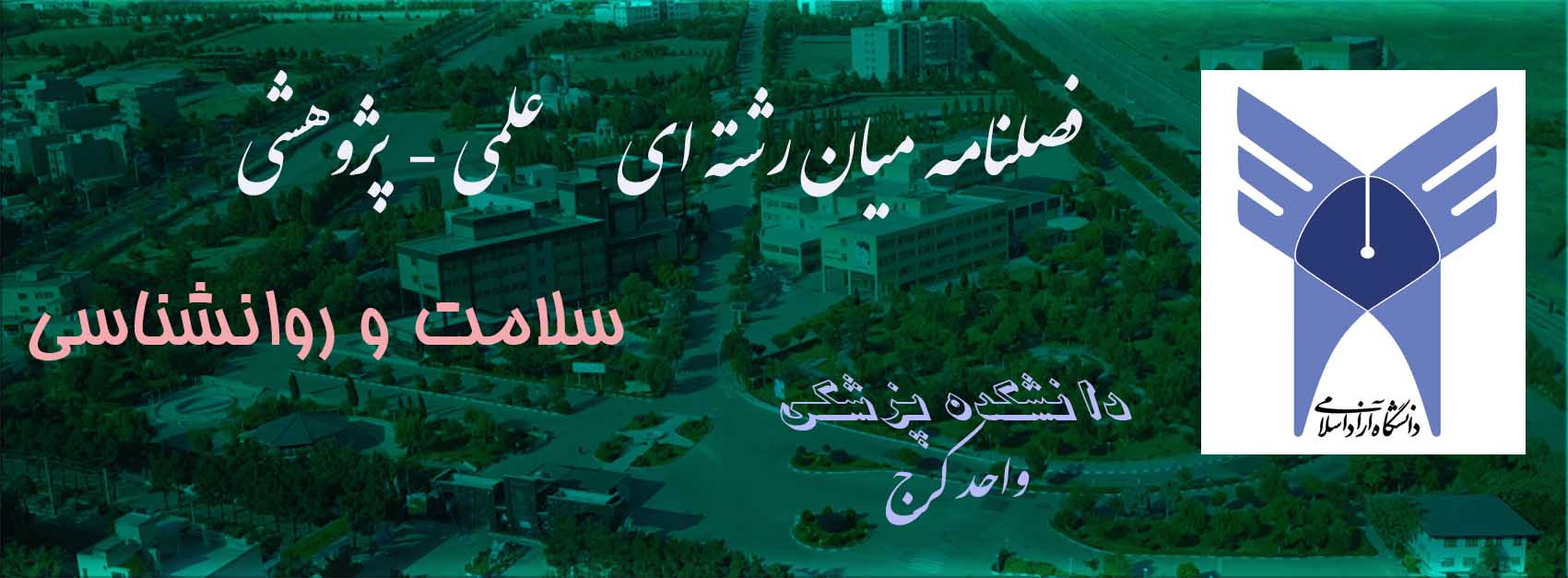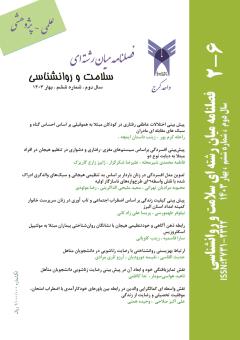ارتباط بهزیستی روانشناختی با رضایت زناشویی در دانشجویان متاهل. (نویسندگان: حدیث القاسی / نفیسه دورودیان / آرزو تاری مرادی)
محورهای موضوعی : روانشناسی حال خوب و بهزیستی روانشناختی
کلید واژه: بهزیستی روانشناختی , رضایت زناشویی , دانشجویان متاهل,
چکیده مقاله :
چکیده این پژوهش با هدف تبیین ارتباط بهزیستی روانشناختی با رضایت زناشویی در دانشجویان متاهل صورت گرفت. پژوهش حاضر توصیفی بود. جامعه آماری پژوهش شامل کلیه دانشجویان متاهل دانشگاه آزاد اسلامی واحد کرج درسال 402-1401 بود که به طور تقریبی برابر با 3500 نفر برآورد شد و به منظور تعیین حجم نمونه از فرمول تاباچینگ وفیدل (2007) استفاده شد. حجم نمونه مورد نیاز 169 نفر برآورد شد و روش نمونه گیری به صورت در دسترس بود. به منظور گردآوری داده¬های پژوهش از پرسشنامه رضایت زناشویی فاورز و السون (1989) و پرسشنامه بهزیستی روانشناختی ریف (1995) نسخه کوتاه استفاده شد. بر اساس نتایج به دست آمده مولفه¬های پذیرش خود، روابط مثبت بادیگران، خودمختاری، تسلط برمحیط، زندگی هدفمند و رشد فردی میتواند به ترتیب 18، 19، 17، 12، 15 و 16 درصد از تغییرات رضایت زناشویی را به صورت مثبت و معناداری تبیین نماید(Sig< 0.05). افراد دارای بهزیستی روانشناختی بالا بیشتر هیجانهای مثبت را تجربه میکنند، رویدادها را مثبت تر ادراک مینمایند و خود را در کنترل و مدیریت رویدادهای پیرامون توانمند ارزیابی میکنند و بنابراین رضایت زناشویی بیشتری خواهند داشت.
Abstract This research was conducted with the aim of explaining the relationship between psychological well-being and marital satisfaction among married students. The present study was descriptive. The statistical population of the research included all married students of Islamic Azad University, Karaj branch in 2022-2023 academic year, which was estimated to be approximately 3500 people, and the sample size was determined using Tabachnick and Fidell's formula (2007). The required sample size was estimated to be 169 people and the sampling method was convenience sampling. To collect research data, the Fowers and Olson Marital Satisfaction Questionnaire (1989) and the Ryff Psychological Well-Being Questionnaire (1995) were used in their short form version. Please specify the statistical method used. Based on the results obtained, self-acceptance, positive relationships with others, autonomy, environmental mastery, purposeful life, and personal growth can explain 18%, 19%, 17%, 12%, 15%, and 16% respectively of the variations in marital satisfaction in a positive and significant way (Sig <0.05). Individuals with high psychological well-being experience more positive emotions, perceive events more positively, evaluate themselves as capable of controlling and managing surrounding events, and therefore have higher marital satisfaction
منابع
برهانی زاده، شبنم و عبدی،رضا(1396). نقش ابعاد مثلث تاریک شخصیت در پیش بینی صمیمیت و نگرش به خیانت زوجین متقاضی طلاق. اندیشه و رفتار در روان شناسی بالینی, 12(45), 17-26.
اخباراتی، فرزانه. (1395). پیش بینی بهزیستی روان شناختی بر اساس عملکرد خانواده و نیاز های بنیادی روان شناختی دانش آموزان. مجله اصول بهداشت روانی،26(9): 9-16.
پروانه، الهام، مومنی؛ خدامراد، پروانه و آذر، کریمی، پروانه. (1396). پیشبینی بهزیستی روانشناختی بر اساس هوش معنوي و سخت رویی در دانشجویان دختر. نشریه اسلام و سلامت، 4(1): 209-163.
ساداتی فیروزآبادی, سمیه و ملتفت, قوام (1396). بررسی شاخصهای روانسنجی مقیاس بهزیستی روانشناختی ریف در دانشآموزان دبیرستانی مدارس تیزهوشان: پایایی، روایی و ساختار عاملی. فصلنامه اندازه گیری تربیتی, 7(27), 103-112 .
سلیمانیان، علی اکیر( 1373) بررسی تاثیر تفکرات غیرمنطقی (بر اساس رویکرد شناختی) بر نارضایتی زناشوئی. پایان نامه دانشگاه تربيت معلم، دانشكده روانشناسي و علوم تربيتي.
گرجی، معصومه. (1395). پیش بینی بهزیستی روانشناختی دانشجویان براساس نیازهای بنیادین روانشناختی وکمال گرایی. پایان نامه ارشدروانشناسی عمومی دانشکده علوم تربیتی وروانشناسی دانشگاه علامه طباطبایی.
نظافت فریزی، جواد؛ مشهدی، علی؛ یزدی؛ سید امیرامین و نوفرستی، فاطمه. (1394). اثربخشی روان درمانی بین فردی کوتاه مدت برافسردگی، ابرازهیجانی، مهارتهای اجتماعی وکیفیت زندگی دانشجویان افسرده. مجله اصول بهداشت روانی،69(17)،60-77.
Tekir, Ö. (2022). The relationship between fear of COVID-19, psychological well-being and life satisfaction in nursing students: A cross-sectional study. Plos one, 17(3), e0264970.
Tiwari, P., & Tripathi, N. (2015). Relationship between depression and psychological well-being of students of professional courses. The International Journal of Indian Psychology, 2(3), 139-146.
Epstein, N. B., Bishop, D. S., & Levin, S. (1978). The McMaster model of family functioning. Journal of Marital and Family therapy, 4(4), 19-31.
Fowers, B. J., & Olson, D. H. (1989). ENRICH Marital Inventory: A discriminant validity and cross‐validation assessment. Journal of marital and family therapy, 15(1), 65-79.
Mousavi, S. M., Bagheri, S. M., Heris, N. J., Matbouraftar, P., Azarian, M., & Kordbagheri, M. (2023). Structural equation modeling to estimate treatment adherence based on the light triad of personality and sense of coherence in patients with type-2 diabetes: examining the mediating role of psychological well-being. Frontiers in Psychology, 14.
Hill, M. M. S., Yorgason, J. B., Nelson, L. J., & Miller, R. B. (2022). Social withdrawal and psychological well-being in later life: does marital status matter?. Aging & Mental Health, 26(7), 1368-1376.
He, Q., Zhong, M., Tong, W., Lan, J., Li, X., Ju, X., & Fang, X. (2018). Forgiveness, marital quality, and marital stability in the early years of Chinese marriage: An actor–partner interdependence mediation model. Frontiers in Psychology, 9, 1520.
Mashal Pour Fard, M., Kavoosi, M., Ebadi, Z., & Moussavi, S. (2016). The relationship between self-efficacy and marital satisfaction among married students. International Journal of Pediatrics, 4(8), 3315-3321.

